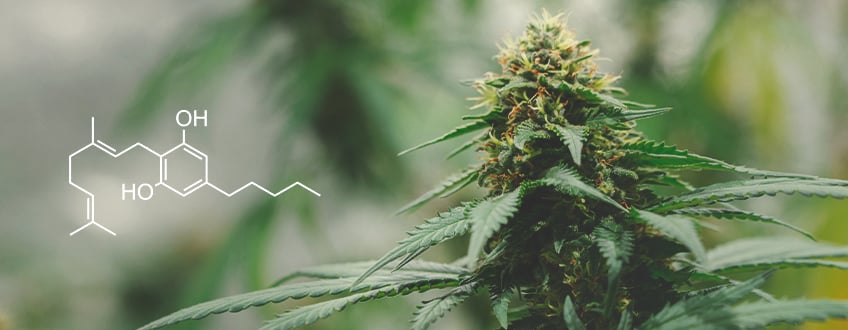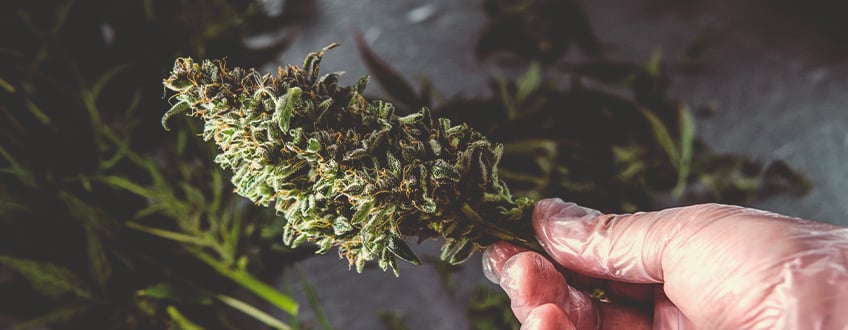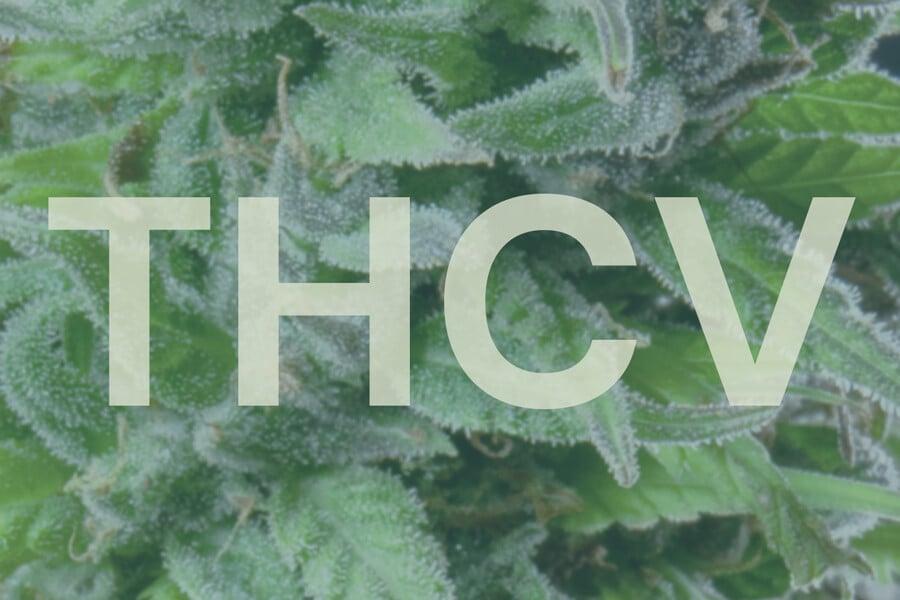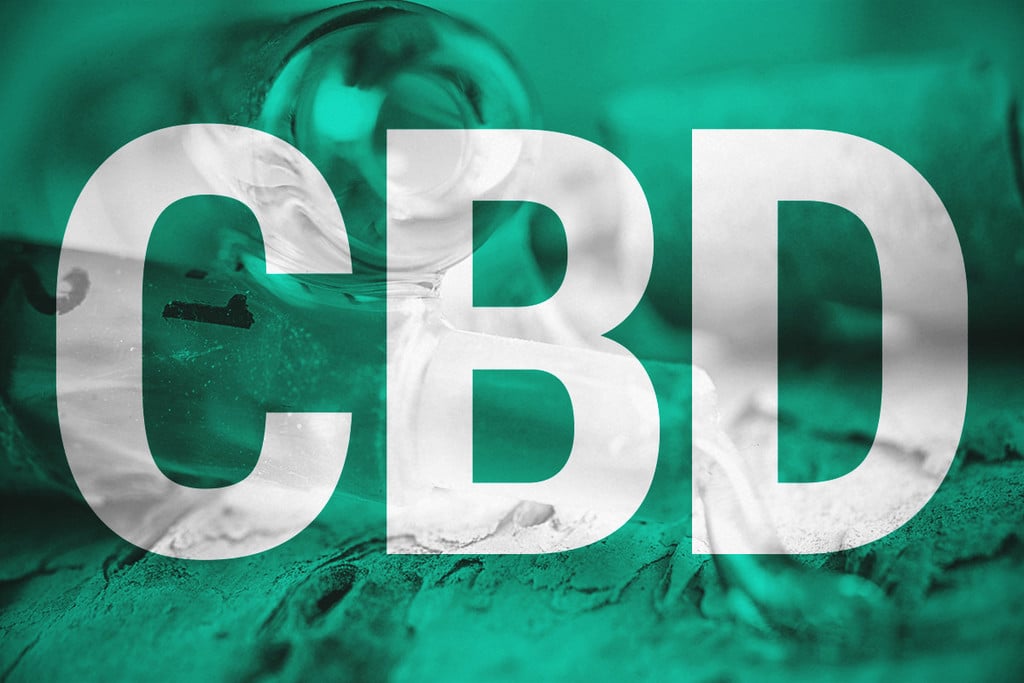.

What Is Cannabigerol (CBG)?
Cannabis flowers are loaded with chemical complexity, and THC and CBD only make up a small part of the picture. Here, you'll learn everything you need to know about a lesser-known cannabinoid: CBG. Discover how cannabis creates this molecule, why THC and CBD wouldn't exist without it, and what unique effects and benefits the cannabinoid offers.
Contents:
CBG: Questions & Answers
- Is CBG Legal?
- Cannabigerol is not scheduled by the UN Convention on Psychotropic Substances. As a result, CBG and its derivatives, such as oils, tinctures, and crystals, are completely legal to buy and consume in most countries.
- Can I Buy CBG Online?
- Yes, CBG can be purchased online, although the cannabinoid is new on the market. The most effective CBG products are full-spectrum extracts containing a complete range of cannabinoids and terpenes. CBD products made with full-spectrum hemp extracts might contain small amounts of CBG as well.
- Does CBG Get You High?
- No, CBG does not make you high. Conversely, the cannabinoid is thought to balance the possible side effects of THC, such as paranoia. To be safe, you should always purchase CBG (or CBD) products from a provider that guarantees THC levels below the legal limit.
- Does CBG Show Up on a Drug Test?
- To date, no drug tests identify levels of CBD or CBG in the body. However, THC screenings might test positive for cannabinoids in general. In rare cases, these unreliable test results might lead to further complications.
Have you ever taken a closer look at a cannabis flower? If so, you probably noticed a bunch of shiny crystals. These minute structures are known as trichomes, and they hold much of the chemical complexity of the cannabis plant.
We all know about THC and CBD at this point. But, trichomes produce over 100 different chemicals belonging to the cannabinoid family. Cannabis scientists are currently unveiling the properties of these constituents, and a few of them stand out as particularly impressive.
Among them is a molecule known as cannabigerol (CBG). Aside from potentially benefitting humans, CBG plays a foundational role in the formation of THC, CBD, and other key players within the cannabis plant.
Continue reading to find out everything you need to know about this fascinating chemical. Discover how it’s created in cannabis, what effects it offers, and how it compares to the better-known cannabinoid CBD.

What Is CBG (Cannabigerol)?
CBG belongs to the cannabinoid family, and plays an interesting role both inside and outside of the cannabis plant.
Pioneering cannabis scientist Dr Raphael Mechoulam isolated CBG from cannabis in 1964, the same year he isolated THC. However, unlike THC, CBG produces no psychotropic effects in humans.
THC produces a high because of the way it interacts with the endocannabinoid system, a body-wide network of receptors that internally produced cannabinoids (aka anandamide and 2-AG) bind to. Given its molecular similarity to internal cannabinoids, THC latches on to CB1 receptors in the brain, giving way to a “high”.
CBG, on the other hand, is thought to bind to the traditional cannabinoid receptors CB1 and CB2 with low affinity. However, it binds to receptors of the “expanded endocannabinoid system” with much higher efficacy, including vanilloid receptors involved in nervous system signalling.
Within the herb, CBG serves as the chemical precursor to other cannabinoids that we know and love. More specifically, it’s the acidic form of CBG—CBGA—that’s responsible for the existence of cannabinoids like THC and CBD. As such, CBGA (and CBG itself) has earned the title of the “mother cannabinoid”.
Biosynthesis of CBG
To understand how CBG is created in cannabis, we have to understand the basics of biosynthesis. Cannabinoid biosynthesis occurs within the trichome glands. “Bio” refers to life, and “synthesis” hints at the creation of something. This complex-sounding word simply boils down to how something—in this case a cannabinoid—comes to be.
There are several biosynthetic pathways utilised in the cannabis plant to produce different cannabinoids. One of these starts with our mother cannabinoid, CBGA (cannabigerolic acid).
Following the creation of CBGA, plant enzymes act on the molecule. These proteins work to catalyse a reaction that transforms the chemical into other cannabinoid acids, including THCA and CBDA.
It takes a specific enzyme to convert CBG into a corresponding molecule. When acted upon by the enzyme THCA synthase, CBGA converts to THCA. When CBDA synthase drives the reaction, the mother cannabinoid turns into CBDA.
It’s only when THCA and CBDA are exposed to sufficient heat that they lose the “A” in their title and turn into their activated (or “decarboxylated”) versions, THC and CBD. The same goes for CBGA's conversion into CBG.
Currently, CBG only occurs in very small quantities within most cannabis varieties. However, researchers have developed chemovars (chemical varieties) that express 100% of their cannabinoid profile as CBG. The results of these breeding programmes prove that high-CBG strains will soon become a popular feature on the cannabis market.


Where Does CBG Come From?
Now you know that THC and CBD ultimately stem from CBGA. But, where does the mother cannabinoid itself come from?
As with most things in plants, the process starts with sunlight. Cannabis plants harness the power of photosynthesis to convert light energy into simple carbohydrate sugars that serve as an energy source. These units of energy allow the plant to conduct basic physiological processes, including metabolic functions.
Plants then use the coenzyme acetyl-CoA to kickstart a long and complex process involving a chain of chemical reactions that we won’t bore you with here. At the end of this process, cannabis plants possess two key molecules: geranyl pyrophosphate (just remember this as “GP”) and olivetolic acid (“OA”).
Once these two molecules form and become available, most of the work is done. All it takes is a reaction between these two chemicals to form CBGA, which then goes on to lay the foundation for the other important cannabinoids mentioned above.
Why Use CBG?
But why should we care about CBG at all? We already have THC to take care of the psychotropic side of things, and CBD does a good job of offering the benefits of cannabis without getting us high.
These are great points, but we need to remember that almost every cannabinoid brings something unique to the table. CBG produces effects that are exclusive to the way it works in the body. It interacts with receptors inside and outside of the endocannabinoid system to create effects that THC and CBD aren’t capable of.
Research into CBG remains quite preliminary. Certainly, we can’t take the current evidence as proof that the molecule produces specific outcomes. We need to wait for controlled human trials before we can provide a true assessment of what CBG can do.
-
CBG and the Nervous System
CBG binds to vanilloid receptors, some of which play a role in transmitting pain signals within the central nervous system. The active component within chili peppers (capsaicin) targets the TRPV1 receptor and, in doing so, causes sensations of heat and pain. However, once it lights up this site, it leads to a desensitisation period and renders the receptors temporarily unable to detect further irritation.
CBG is thought to work in the same way, yet the cannabinoid does so without causing irritation in the first place. CBG may also exert soothing effects in a similar fashion, as it binds to the same receptor site[1].
Early research has also investigated CBG for its potential as a nervous system therapeutic. Research published within the Journal of Neuroimmune Pharmacology shows that molecular relatives of CBG were able to soothe irritation[2] within components of the nervous system in mice.
The mother cannabinoid also appears to aid in relaxing the muscles. By stopping the reuptake of GABA, a relaxing neurotransmitter, CBG may help to relieve tension and tightness[3].

-
CBG and the Brain
Could CBG eventually be labelled as a nootropic cannabinoid? Maybe. Early mouse research has looked into CBG’s ability to improve mood[4]. As it interacts with serotonin receptors in the brain, scientists are eager to see if CBG might be of benefit to those experiencing tension and shaky nerves.
A study within the journal Neurotherapeutics sought to determine the neuroprotective effects of CBG. Researchers tested the cannabinoid in an animal model of Huntington’s disease, a condition that affects mood, movement, and thinking. Overall, their findings[5] pave the way for future, more in-depth research on the subject.
-
CBG and the Digestive System
Recent discoveries surrounding the microbiome and gut health demonstrate the vital importance of the digestive system in human health.
Currently, IBS affects approximately 10–15% of the population in Europe and North America. The condition likely stems from immune dysfunction within the gut, and results in stomach pain, cramps, and bloating.
Research published in the journal Biochemical Pharmacology tested CBG[6] on the incurable disease in mice. Researchers noted reduced biomarkers associated with the condition, and reduced free radical production in gut cells.
-
CBG and the Musculoskeletal System
Going forward, CBG might also play a role in promoting bone health. Osteoporosis, or loss of bone density, occurs when cells that break down bone outcompete those that lay bone tissue down. It arises due to genetic factors, hormonal changes, and a lack of adequate stress in the form of exercise.
Early research has looked into whether CBG may support the process of bone healing, but we’re still some ways away from any real answers regarding CBG’s bone-health-promoting potential.
The Future of CBG
CBD managed to gain traction once scientists unveiled its mechanism and potential effects. From here, consumers were quick to take advantage of the cannabinoid, and many now rave about the effects they experience. CBG is likely to follow this trajectory. Early research appears promising, but we need comprehensive human studies to really reveal what the cannabinoid can do.
Many cannabis and hemp-derived products are emerging in the marketplace, from raw flower to oils, that offer high quantities of CBG. Looking toward the future, CBG will likely join the cannabinoid pantheon alongside CBD and THC.
Which Is Better: CBG or CBD
Neither CBD nor CBG is superior. Although they share similarities, they work in unique ways. CBD certainly has more scientific evidence and popularity behind it. However, as CBG continues to undergo more study and garner more mainstream attention, users will likely opt for the cannabinoid in addition to THC and CBD formulations.
|
CBG CBG Based on current research, we know the following about CBG: |
| Low affinity for classic cannabinoid receptors (CB1 and CB2) |
| Interfaces mainly with the expanded endocannabinoid system |
| Non-psychotropic |
| Precursor to other primary cannabinoids |
| Insignificant study on therapeutic potential |
| Not many options for the consumer (for now) |
|
CBD CBD has much more research behind it, and users can access the cannabinoid in many different forms: |
| Low affinity for CB1 and CB2 |
| Non-psychotropic |
| Helps boost endocannabinoid levels in the body |
| Somewhat well-studied (compared to other cannabinoids) |
| Available in a diverse array of products, including cannabis and hemp flower, extracts, and edibles |
|
CBG CBG Based on current research, we know the following about CBG: |
| Low affinity for classic cannabinoid receptors (CB1 and CB2) |
| Interfaces mainly with the expanded endocannabinoid system |
| Non-psychotropic |
| Precursor to other primary cannabinoids |
| Insignificant study on therapeutic potential |
| Not many options for the consumer (for now) |
|
CBD CBD has much more research behind it, and users can access the cannabinoid in many different forms: |
| Low affinity for CB1 and CB2 |
| Non-psychotropic |
| Helps boost endocannabinoid levels in the body |
| Somewhat well-studied (compared to other cannabinoids) |
| Available in a diverse array of products, including cannabis and hemp flower, extracts, and edibles |
Although different in several key ways, CBG and CBD could make a great pair when consumed together. By harnessing the qualities of both, consumers can support their well-being from multiple angles, even if we have yet to know what exactly CBG is capable of. This practice, which plays into the “entourage effect” theory, supports the idea that numerous cannabinoids are better than one when it comes to effects in humans.
Is CBG Safe?
Available studies claim that CBG is safe to use and well-tolerated[7] in animals. Unlike THC, CBG doesn’t pose any psychotropic side effects.
If you’re curious about experiencing the effects of CBG for yourself, check out the Royal Queen Seeds range of CBG oils and high-CBG cannabis strains.
CBG: An Expensive Cannabinoid
Extracting and isolating CBG from hemp and cannabis plants is an expensive process. This particular cannabinoid is found only in trace amounts, and it’s never been the focus of cannabis breeders over the years. Instead, THC and, more recently, CBD have been the two cannabinoids in the limelight.
The majority of cannabis strains contain less than 2% CBG, which means it takes a lot of mature flowers to isolate only a small amount of CBG. Otherwise, a producer could give up an entire THC/CBD crop, harvesting early to harness more CBG before its natural conversion into other compounds. In addition to its scarcity, CBG requires expensive equipment to extract, while breeding new CBG-dominant strains can take years, further increasing costs.
- Cannabis Pharmacology: The Usual Suspects and a Few Promising Leads - ScienceDirect https://www.sciencedirect.com
- A cannabigerol quinone alleviates neuroinflammation in a chronic model of multiple sclerosis - PubMed https://pubmed.ncbi.nlm.nih.gov
- Cannabis Pharmacology: The Usual Suspects and a Few Promising Leads - ScienceDirect https://www.sciencedirect.com
- Cannabis Pharmacology: The Usual Suspects and a Few Promising Leads - ScienceDirect https://www.sciencedirect.com
- Neuroprotective properties of cannabigerol in Huntington's disease: studies in R6/2 mice and 3-nitropropionate-lesioned mice - PubMed https://pubmed.ncbi.nlm.nih.gov
- Beneficial effect of the non-psychotropic plant cannabinoid cannabigerol on experimental inflammatory bowel disease - PubMed https://pubmed.ncbi.nlm.nih.gov
- Cannabigerol is a novel, well-tolerated appetite stimulant in pre-satiated rats https://www.ncbi.nlm.nih.gov





































